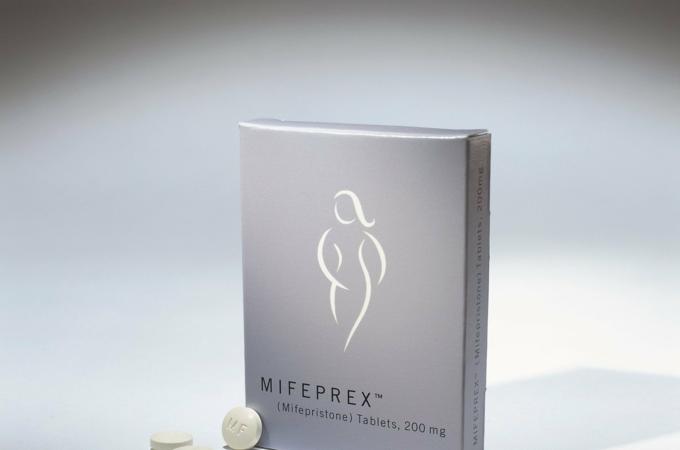FDA criticized for lifting in-person requirement to receive abortion drug
WASHINGTON (CNS) -- The decision by the U.S. Food and Drug Administration's acting commissioner to suspend enforcement of the agency's in-person prescribing requirement for the abortion drug endangers women's health and possibly their lives, pro-life leaders said.
On April 12, Dr. Janet Woodcock said the FDA will "exercise enforcement discretion" regarding its own requirement that is part of the risk management program for mifepristone as long as President Joe Biden's declaration of a public health emergency for COVID-19 remains in place.
The brand name for mifepristone is Mifeprex. Also called RU-486, it is used to end pregnancies during the first 10 weeks.
Archbishop Joseph F. Naumann of Kansas City, Kansas, chairman of the U.S. bishops' Committee on Pro-Life Activities, said April 16 it was difficult to see the FDA's decision "as anything other than callous capitulation to the requests of abortion activists without regard for the health and safety of the women involved."
"With this decision, not only are women being sold the lie that abortion will solve their problems, but also that chemical abortion is a safe and easy way to go about it," he said in a statement. "By pushing women away from medical oversight, abortion advocates are luring women into isolated, unsafe, and medically unwise decisions."
"The inalienable dignity of women and their unborn children deserves so much more," he added.
Woodcock said making women pick up the drug may increase their risk of contracting COVID-19, FDA said, so it will temporarily allow clinics to distribute the drug via telemedicine, directly by mail or through a mail-order pharmacy.
FDA regulations also required patients to sign a form acknowledging risks associated with the drug before they could receive it in person.
"An in-person evaluation by a medical professional is necessary to accurately determine the age of the baby" because abortion pills are only approved for use in the first 70 days, Archbishop Naumann said.
This evaluation also is needed "to determine whether the pregnancy is ectopic," which the woman has no way of knowing on her own, he continued, and as well as "to test and treat for Rh-incompatibility between mother and baby."
"Without this information and proper treatment, a woman's health, future fertility and life are placed in serious jeopardy," he said.
Rh incompatibility occurs when a woman who has Rh-negative blood becomes pregnant with a baby with Rh-positive blood. These antibodies help drive an immune system attack against the baby, which the mother's body views as a foreign object. Rh immune globulin must be administered during the woman's pregnancy to prevent this incompatibility.
"The FDA's announcement yesterday that they plan to lift safety restrictions that govern the dispensing of medication abortions makes women's health simply a pawn in the effort to push for more abortion," Dr. Christina Francis, chair of the American Association of Pro-Life OB/GYNs, said in an April 13 statement.
Francis said her organization "represents approximately 7,000 women's health care practitioners who will not allow our patients' lives to be put in jeopardy in order to appease the abortion industry and their allies."
"An in-person visit is medically necessary and sound medical practice because it ensures that every woman receives a full evaluation for any contraindications to a medication abortion," she said.
She said a recent analysis of adverse events submitted to the FDA with the safety regulations in place "shows over 3,000 women suffering with complications, of which 24 of these women died, and another 500 would have died if they had not reached emergency medical care in time."
These numbers "will only increase" with the current safety regulations removed, she added.
"The Biden administration makes catastrophic loss of life by mail its legacy in choosing to weaken the minimal health and safety in place to protect women from the deadly consequences of chemical abortion pills," said Students for Life Action, a sister organization of Students for Life of America.
"Sending deadly pills through the mail without any prescreening or follow-up care is convenient and cost effect for corporate abortion, but women will pay the price along with countless preborn infants," the organization said April 13, adding that the abortion drug now ends over 40% "of preborn life."
In July 2020, U.S. District Judge Theodore Chuang in Maryland agreed to suspend a rule that requires women during the COVID-19 pandemic to visit a hospital, clinic or medical office to obtain an abortion pill.
He concluded that the "in-person requirements" for patients seeking medication abortion care impose a "substantial obstacle" to women seeking an abortion and are likely unconstitutional under the circumstances of the pandemic.
The American College of Obstetricians and Gynecologists and other groups sued the FDA and the U.S. Department of Health and Human Services in May 2020 to challenge the in-person dispensing rule arguing it infringed on a woman's lawful right to obtain an abortion.
In his ruling, Chuang said suspending the requirements aligns with public health guidance to eliminate unnecessary travel and in-person contact.
The Trump administration appealed the ruling and on Jan. 12, 2020, the U.S. Supreme Court reinstated the federal requirement that women who are seeking abortion-inducing drugs must do so in person, not by mail.
A U.S. Conference of Catholic Bishops' news release with Archbishop Naumann's statement noted the in-person requirement for receiving the abortion drug was first put in place by public health officials under President Bill Clinton.
These officials saw it "as a necessary precondition to ensure that pregnant women do not have contraindications that would make the abortion pills even more unsafe and possibly deadly for the woman."
- - -
Follow Asher on Twitter: @jlasher



















